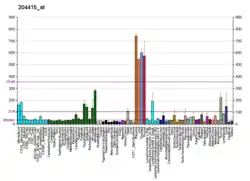IFI6
Interferon alpha-inducible protein 6 is a protein that in humans is encoded by the IFI6 gene.[3]
This gene was first identified as one of the many genes induced by interferon. The encoded protein may play a critical role in the regulation of apoptosis. A mini-satellite that consists of 26 repeats of a 12 nucleotide repeating element resembling the mammalian splice donor consensus sequence begins near the end of the second exon. Alternatively spliced transcript variants that encode different isoforms by using the two downstream repeat units as splice donor sites have been described.[3]
An antiviral function has been attributed to IFI6 against several members of theFlaviviridae family (DENV, YFV, ZIKV, WNV). IFI6 was able to interfere with the virus replication by preventing the formation of virus-induced membrane structures that represent a replication organelle.[4]
References
- GRCh38: Ensembl release 89: ENSG00000126709 - Ensembl, May 2017
- "Human PubMed Reference:". National Center for Biotechnology Information, U.S. National Library of Medicine.
- "Entrez Gene: IFI6 interferon, alpha-inducible protein 6".
- Richardson RB, Ohlson MB, Eitson JL, Kumar A, McDougal MB, Boys IN, et al. (November 2018). "A CRISPR screen identifies IFI6 as an ER-resident interferon effector that blocks flavivirus replication". Nature Microbiology. 3 (11): 1214–1223. doi:10.1038/s41564-018-0244-1. PMC 6202210. PMID 30224801.
Further reading
- Itzhaki JE, Barnett MA, MacCarthy AB, Buckle VJ, Brown WR, Porter AC (December 1992). "Targeted breakage of a human chromosome mediated by cloned human telomeric DNA". Nature Genetics. 2 (4): 283–287. doi:10.1038/ng1292-283. PMID 1303280. S2CID 38466985.
- Clauss IM, Wathelet MG, Szpirer J, Content J, Islam MQ, Levan G, et al. (1990). "Chromosomal localization of two human genes inducible by interferons, double-stranded RNA, and viruses". Cytogenetics and Cell Genetics. 53 (2–3): 166–168. doi:10.1159/000132920. PMID 1695131.
- Itzhaki JE, Porter AC (July 1991). "Targeted disruption of a human interferon-inducible gene detected by secretion of human growth hormone". Nucleic Acids Research. 19 (14): 3835–3842. doi:10.1093/nar/19.14.3835. PMC 328471. PMID 1713665.
- Kelly JM, Porter AC, Chernajovsky Y, Gilbert CS, Stark GR, Kerr IM (July 1986). "Characterization of a human gene inducible by alpha- and beta-interferons and its expression in mouse cells". The EMBO Journal. 5 (7): 1601–1606. doi:10.1002/j.1460-2075.1986.tb04402.x. PMC 1166985. PMID 3017706.
- Porter AC, Chernajovsky Y, Dale TC, Gilbert CS, Stark GR, Kerr IM (January 1988). "Interferon response element of the human gene 6-16". The EMBO Journal. 7 (1): 85–92. doi:10.1002/j.1460-2075.1988.tb02786.x. PMC 454218. PMID 3359997.
- Friedman RL, Manly SP, McMahon M, Kerr IM, Stark GR (October 1984). "Transcriptional and posttranscriptional regulation of interferon-induced gene expression in human cells". Cell. 38 (3): 745–755. doi:10.1016/0092-8674(84)90270-8. PMID 6548414. S2CID 37810920.
- Turri MG, Cuin KA, Porter AC (June 1995). "Characterisation of a novel minisatellite that provides multiple splice donor sites in an interferon-induced transcript". Nucleic Acids Research. 23 (11): 1854–1861. doi:10.1093/nar/23.11.1854. PMC 306954. PMID 7596809.
- Hofmann WA, Stojiljkovic L, Fuchsova B, Vargas GM, Mavrommatis E, Philimonenko V, et al. (November 2004). "Actin is part of pre-initiation complexes and is necessary for transcription by RNA polymerase II". Nature Cell Biology. 6 (11): 1094–1101. doi:10.1038/ncb1182. PMID 15502823. S2CID 23909479.
- Tahara E, Tahara H, Kanno M, Naka K, Takeda Y, Matsuzaki T, et al. (August 2005). "G1P3, an interferon inducible gene 6-16, is expressed in gastric cancers and inhibits mitochondrial-mediated apoptosis in gastric cancer cell line TMK-1 cell". Cancer Immunology, Immunotherapy. 54 (8): 729–740. doi:10.1007/s00262-004-0645-2. PMID 15685448. S2CID 13399785.


